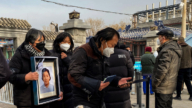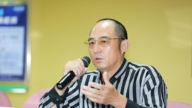【新唐人2011年3月14日訊】官員財產公開,在大陸可以說是千呼萬喚。兩會上,官員財產公開問題再次成為熱點,而今年人大代表提議也有了答復:中紀委聲稱將起草建議稿。但分析人士認為,大陸官員財產公示難起步。
《京華時報》報導,連續六年提議對公務員財產申報問題立法的韓德雲代表,已從中紀委收到回覆:中紀委表示﹔已就此事進行了研究論證,已著手起草建議稿。
6年間,相關機構對這個議案的答復年年有變化,從 “制定財產申報法條件尚不成熟”、“全面推行公務員財產申報制度尚存一定困難”,到“正在積極開展工作”等。
對此,英國《金融時報》感到困惑,官員財產公開工作的推進速度之慢,與政府其他政策出臺速度之快,簡直是天壤之別。官員財產在1988年就提出了立法動議,20多年過去,除了一些黨內規定外,法律上沒有任何進步。相比而言,遠的如2008年底的4萬億經濟刺激計劃,近的如實行房產稅、樓市限購令與首都治堵方案,在所謂“現實需要”下應聲而出,而受到影響者的「反對之聲」卻完全被忽略。
《金融時報》認為,世界法治昌明的國家,普遍對官員財產申報與公示有立法。俄羅斯本屆政府的做法值得大陸借鑒:俄羅斯2008年底實施《反腐敗法》,要求高官公布財產狀況,20多天後,總統梅德韋傑夫就公開了個人財產。
此前,中國社科院法學所公布的一項調查顯示,81.4%的被調查者認為公職人員應當公開他們的財產狀況,有70%的被調查公職人員也認為應當公開公職人員財產。北京理工大學經濟學教授胡星斗認為,現在大陸實行官員收入與財產申報制度的時機已經成熟。如果不乘勢有所作為,對反腐倡廉十分不利。
不過,大陸官員將要公開財產,中國人權觀察主席秦永敏表示:是不可能的事情。
秦永敏:“因為中國的腐敗不是一般的腐敗,是制度性的腐敗,所有的官員的財產基本上都有同類問題,他們名義上的收入非常有限,但他們財產非常驚人。一公開,每一個官員都有同樣問題,怎麼向人民交代,怎麼向世界交代,在這種情況下,公開財產問題完全沒有希望的。”
有人則更悲觀。上海維權人士許正凊對新唐人表示:“中共體制內的監管根本不起作用的,我們知道,一些反貪局的局長、紀檢委的書記都是大貪官。”
他認為:最高領導人財產都有問題,上行下效,導致無官不貪。現在官員在任職內就是能貪一天就貪一天,能多貪一天就多貪一天。
新唐人記者宋風、李若琳綜合報導。
Declaring Assests? Impossible
There has been repeated calls for Chinese officials
to declare their assets. During the “two meetings,”
it has again become a hot topic.
CCP』s Central Committee for Discipline Inspection
claims it will draft a proposal. However,
analysts say, it is hard to actually make it happen.
Beijing Times reports, People』s Representative
Han Deyun, who proposed a legislation with regard
to civil servants』 property declaration for six years,
received a reply from the Committee for Discipline
Inspection, saying they had studied the matter
and would draft a proposal.
Over the past 6 years, replies from related offices
vary, such as “the condition is far from being mature
enough to make a law,” “there are difficulties in
institutionalizing civil servants』 property declaration,”
and “the work is in progress.”
The UK Financial Times asked why it took so long
to make officials declare their assets, while it was
pretty fast for the government to make other
policies. The motion for officials to declare their
properties was proposed in 1988.
Over two decades later,
there still aren』t any laws or acts, while other acts
such as the USD 4 trillion stimulus plan,
the property tax, property market ban,
and traffic jam solutions in Beijing, came out
promptly “as necessary.”
The voices of objection were silenced.
FT said, countries with rule of law have laws
to regulate officials』 property declaration.
What the Russian government did can be an example
for the Chinese government. In 2008, they launched
an “anti-corruption law,” which required its senior
officials to declare their assets. 20 days later,
President Medvedev declared his assets.
The Institute of Law Studies at the Chinese Academy
of Social Sciences held a survey, where 81.4% of
respondents thought that people in public positions
should declare their assets. 70% believed
the information should be made public.
Economic Professor Hu Xingdou believes, it is time
to institutionalize property declaration for officials.
Otherwise, it won』t help with anti-corruption.
“It is impossible for officials to declare their
properties,” said Qin Yongmin, Chairman of
China Human Rights Watch.
Qin: “Corruption in China is not common corruption.
It is system corruption. The properties of all officials
have similar problems. On the surface, they have
limited income, but they have stunningly large
properties. Once declared,
each official will have corruption issues.
How can they face the people and the world?
So I don』t think they』ll declare it at all.”
Some were even more pessimistic.
Shanghai activist Xu Zhengqing told NTDTV,
“The supervision within the Communist Party』s
system doesn』t work.
Some chiefs of anti-corruption bureaus and
party chiefs of discipline inspection committees
are big corrupt officials themselves.”
He thinks, since the senior officials all have
problems with their properties, their subordinates
follow suit, which leads to a system of complete
corruption. The incumbent officials tend to be
corrupt as long as possible while in their position.
NTD reporters Song Feng and Li Ruolin.



























